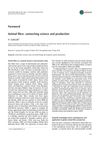 70 citations,
August 2020 in “Nanomaterials”
70 citations,
August 2020 in “Nanomaterials” Electrospun nanofibers show promise for enhancing blood vessel growth in tissue engineering but need further research to improve their effectiveness.
 67 citations,
July 2016 in “Reviews in Endocrine and Metabolic Disorders”
67 citations,
July 2016 in “Reviews in Endocrine and Metabolic Disorders” Stress can worsen skin conditions by affecting hormone levels and immune response.
 60 citations,
April 2012 in “Physiology”
60 citations,
April 2012 in “Physiology” The document concludes that understanding hair and feather regeneration can help develop new regenerative medicine strategies.
 58 citations,
January 2006 in “Skin Pharmacology and Physiology”
58 citations,
January 2006 in “Skin Pharmacology and Physiology” High levels of testosterone and 5α-DHT can lead to cell death in cells important for hair growth.
 57 citations,
March 2013 in “Journal of Dermatological Science”
57 citations,
March 2013 in “Journal of Dermatological Science” Improving the environment and cell interactions is key for creating human hair in the lab.
 51 citations,
March 2019 in “Journal of cellular physiology”
51 citations,
March 2019 in “Journal of cellular physiology” Platelet lysate is a promising, cost-effective option for regenerative medicine with potential clinical applications.
 39 citations,
January 2013 in “Indian Journal of Dermatology, Venereology and Leprology”
39 citations,
January 2013 in “Indian Journal of Dermatology, Venereology and Leprology” Eating high glycemic foods and drinking milk may worsen acne by increasing insulin and IGF-1 levels.
 30 citations,
December 2017 in “Medical Hypotheses”
30 citations,
December 2017 in “Medical Hypotheses” The model suggests that scalp tension could lead to hair loss, with factors like blood vessel hardening, enlarged oil glands, and poor microcirculation also playing a role. It also hints at a possible link between skull shape and baldness pattern.
 15 citations,
February 2021 in “Scientific Reports”
15 citations,
February 2021 in “Scientific Reports” RNA aptamers can specifically block FGF5-related cell growth, potentially treating related diseases or hair disorders.
14 citations,
December 2016 in “PloS one” Keratin 26 affects cashmere goat hair growth and is influenced by various treatments.
 14 citations,
January 2008 in “Gene therapy”
14 citations,
January 2008 in “Gene therapy” Gene therapy shows promise for enhancing physical traits but faces ethical, safety, and regulatory challenges.
 7 citations,
January 2017 in “Journal of cosmetology & trichology”
7 citations,
January 2017 in “Journal of cosmetology & trichology” Good nutrition is crucial for healthy hair and can help with hair loss without medication.
7 citations,
June 2012 in “Journal of dairy science” Bovine milk fats applied to mouse skin can promote hair growth similar to known hair growth treatments.
 1 citations,
March 2022 in “Daehanhanuihakoeji”
1 citations,
March 2022 in “Daehanhanuihakoeji” Artemisia sieversiana extract may help prevent hair loss and promote hair growth.
 November 2023 in “Food science of animal resources”
November 2023 in “Food science of animal resources” Lactilactobacillus curvatus LB-P9 taken orally helps hair regrow faster and thicker in mice.
 January 2017 in “International journal of clinical & experimental dermatology”
January 2017 in “International journal of clinical & experimental dermatology” Eating a balanced diet with vitamins, micronutrients, and antioxidants is important for hair health and can help with hair loss.
Avicennia Marina extract and avicequinone C can reduce hair loss hormone production and increase hair growth factors, suggesting they could be used to treat androgenic alopecia.
 April 2003 in “Experimental Dermatology”
April 2003 in “Experimental Dermatology” The workshop highlighted the genetic links and psychological impacts of hair loss and skin disorders.
 277 citations,
July 2011 in “Journal of the Dermatology Nurses’ Association”
277 citations,
July 2011 in “Journal of the Dermatology Nurses’ Association” The skin's layers protect, sense, and regulate the body's internal balance, but can be prone to cancer.
 32 citations,
March 2021 in “Journal of endocrinological investigation”
32 citations,
March 2021 in “Journal of endocrinological investigation” Thyroid hormones are important for skin health and changes in them can affect conditions like hair loss and eczema.
 24 citations,
January 2020 in “International Journal of Molecular Sciences”
24 citations,
January 2020 in “International Journal of Molecular Sciences” Some plants with flavonoids may help treat hair loss and promote hair growth.
 13 citations,
January 2010 in “Advances in Biochemical Engineering / Biotechnology”
13 citations,
January 2010 in “Advances in Biochemical Engineering / Biotechnology” Understanding hair biology is key to developing better treatments for hair and scalp issues.
 4 citations,
January 2010 in “Animal”
4 citations,
January 2010 in “Animal” Improving knowledge and practices in animal fibre production is crucial to meet market demands and potentially revive natural fibres.
 1 citations,
December 2011
1 citations,
December 2011 Marine-derived ingredients show potential for hair health but need more human trials to confirm effectiveness.
 May 2024 in “Journal of functional foods”
May 2024 in “Journal of functional foods” Coffee bean residue extract helps hair growth by activating cell processes.
 August 2019 in “Journal of the American Academy of Dermatology”
August 2019 in “Journal of the American Academy of Dermatology” Ginseng and Albizia extracts help prevent hair thinning with age.

Blocking 11β-HSD1 reduces stress hormone damage in hair growth cells.
 September 1997 in “JEADV. Journal of the European Academy of Dermatology and Venereology/Journal of the European Academy of Dermatology and Venereology”
September 1997 in “JEADV. Journal of the European Academy of Dermatology and Venereology/Journal of the European Academy of Dermatology and Venereology” Blocking IL-1 could help treat some hair loss conditions; alopecia affects liver detox systems; spironolactone is better than finasteride for female hair growth; focusing on the catagen hair phase could lead to new alopecia treatments.
January 2023 in “Iranian Journal of Pharmaceutical Research” Stauntonia hexaphylla extract can help treat hair loss by blocking certain hormones.
 April 2024 in “Bioactive materials”
April 2024 in “Bioactive materials” New microneedle treatment with growth factors and a hair loss drug shows better and faster hair growth results than current treatments.

























